
Dr. Nguyen Thi Hanh, Director of the Department of Criminal and Administrative Law, Ministry of Justice , delivered the opening speech at the Conference. Photo: VGP/DA
The law still reveals some limitations.
Speaking at the opening of the Conference, Dr. Nguyen Thi Hanh, Director of the Department of Criminal and Administrative Law, Ministry of Justice, said that the Law on Access to Information plays an important role in ensuring citizens' right to access information. In recent times, information disclosure has been carried out regularly and promptly by agencies, basically meeting the information needs of people, organizations and businesses. The work of providing information upon request has gradually become routine. Ensuring the necessary conditions for providing information has been of interest to state agencies.
These results have made an important contribution to ensuring citizens' right to access information, while enhancing publicity, transparency and accountability in the operations of state agencies.
However, after nearly 10 years of promulgation and coming into force, the 2016 Law on Access to Information has revealed a number of shortcomings and limitations that have been reflected by agencies, ministries, branches and localities during the process of reviewing and summarizing the implementation of the Law.
For example, some regulations on determining inaccessible information are still confusing to implement; the order and procedures for providing information upon request are still complicated, not meeting the requirements of administrative reform, especially in the context of promoting the construction of databases, data interconnection, digital transformation, etc.).
In addition, the context of reorganizing the state apparatus, organizing two-level local government and amending, supplementing and promulgating a number of new laws related to access to information in recent times (such as the Law on Implementing Democracy at Grassroots Level, Data Law, Law on Personal Data Protection, Law on Archives, etc.) also requires early research to amend and supplement the Law on Access to Information to suit the new situation, ensuring consistency and synchronization with the legal system.
According to Resolution No. 105/2025/UBTVQH15 dated September 26, 2025 of the National Assembly Standing Committee on the 2026 Legislative Program, the Law on Access to Information (amended) is expected to be submitted to the National Assembly for consideration and approval at the 1st Session of the 16th National Assembly (April 2026). This is also the first time the Department of Criminal and Administrative Law has been assigned by the Ministry's leaders to organize a policy consultation conference according to the new provisions of the Law on Promulgation of Legal Documents in 2025.
The conference also heard Dr. Nguyen Thi Hanh introduce the main policy contents of the Law on Access to Information (amended) focusing on issues of: Expanding the subjects responsible for providing information; expanding the scope of information that must be made public; more clearly defining the scope of accessible information, inaccessible information and information with conditions; diversifying forms of information provision, associated with promoting the application of science and technology and digital transformation; and costs of accessing information.
It is necessary to amend the Law, especially in the context of streamlining the apparatus.
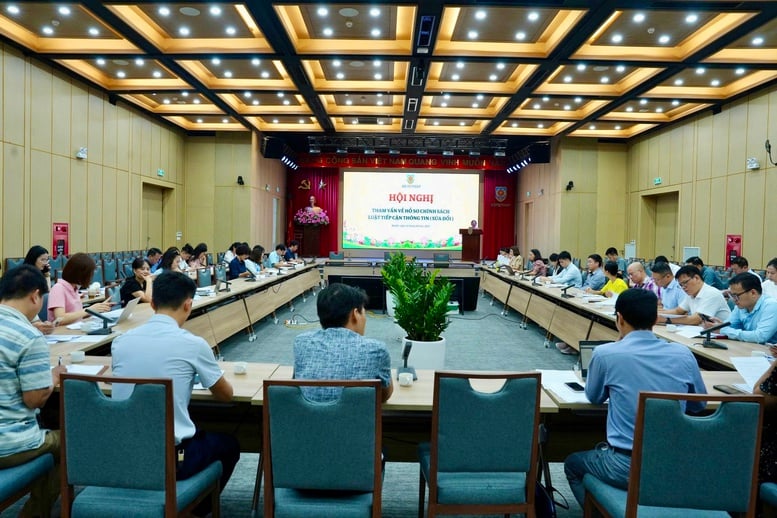
Conference scene. Photo: VGP/DA
At the Conference, delegates actively spoke and commented on the content of the Law's policy dossier, and shared more difficulties and shortcomings in the practical implementation of the 2016 Law on Access to Information. The majority highly appreciated the Ministry of Justice's preparation of the policy dossier, and basically agreed on the composition and basic content of the policy dossier.
Many opinions have covered the core issues of the Law such as the subjects responsible for providing information according to the provisions of this Law; the scope of information that agencies, organizations and units are obliged to publicize; the scope of information that citizens can access; subjects with the right to request information according to the provisions of this Law; methods of providing information in line with the current trend of promoting digital transformation such as through data portals, national public service portals, etc.; the issue of providing information by People's Committees at the commune level; costs of accessing information; implementation of information access according to the provisions of this Law and specialized laws, etc.
Speaking at the Conference, the representative of the Hanoi Department of Planning and Architecture reflected on specific issues regarding access to information in the planning field; regulations related to public disclosure and provision of information in the Law on Urban and Rural Planning. At the same time, it was proposed to have specific instructions on the implementation of some provisions of the Law to facilitate the process of law application...
Also at the Conference, Dr. Nguyen Thi Kim Thoa (former Director of the Department of Criminal and Administrative Law, Ministry of Justice) clarified the purpose and scope of the Law on Access to Information at the time of its formulation and promulgation in 2016; agreed on the necessity of amending this Law in the current context, especially after the agencies have been reorganized, the organizational structure has been streamlined, and the organizational model of local authorities at the commune level has changed. In addition, Dr. Thoa suggested a more thorough assessment of the policy on fees for access to information.
Dr. Hoang Thi Ngan (former Director of the Department of State Organization and Public Affairs, Government Office) suggested that the policy proposal agency pay attention to reviewing the law, ensuring the consistency and unity of the Law policies with related laws newly issued in the recent past, such as the Law on Implementing Democracy at the Grassroots Level, the Law on Data...
Dr. Ngan also noted to the Ministry of Justice some specific issues of the policy dossier such as specifically defining the scope of agencies, organizations, and units responsible for providing information according to the provisions of the Law; the development of policies on information access fees must be consistent with the socio-economic conditions of the country and the lives and incomes of the people; clarifying the concept of basic and essential public services; adding administrative organizations such as industrial park management boards, etc.
In addition, some opinions suggested continuing to review more carefully specialized laws related to information (including laws under construction and laws about to be amended and supplemented); assessing the impact of policy solutions more specifically; adjusting some contents in the draft policy legalization to ensure consistency between the contents of regulations...
Concluding the conference, Dr. Nguyen Thi Hanh highly appreciated the enthusiastic, profound, highly constructive and closely related opinions of the delegates to the policy issues of the Law. Many opinions added practical information on the provision of information in different sectors and fields, and at the same time gave specific comments on the content of the policies of the Law on Access to Information (amended) and the expected legalization of the policy.
"The comments of the delegates are a very important and valuable source of reference for the Ministry of Justice to continue perfecting the policy dossier of the draft Law on Access to Information (amended) before sending it to agencies, ministries, branches and localities for official comments, ensuring the progress and quality of the Law's development," Ms. Nguyen Thi Hanh emphasized.
Dieu Anh
Source: https://baochinhphu.vn/tham-van-ve-ho-so-chinh-sach-luat-tiep-can-thong-tin-sua-doi-102251016223222562.htm



![[Photo] General Secretary To Lam attends the 18th Hanoi Party Congress, term 2025-2030](https://vphoto.vietnam.vn/thumb/1200x675/vietnam/resource/IMAGE/2025/10/16/1760581023342_cover-0367-jpg.webp)

![[Photo] Nhan Dan Newspaper launches “Fatherland in the Heart: The Concert Film”](https://vphoto.vietnam.vn/thumb/1200x675/vietnam/resource/IMAGE/2025/10/16/1760622132545_thiet-ke-chua-co-ten-36-png.webp)


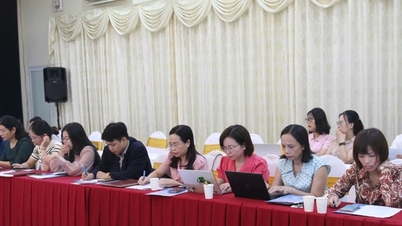

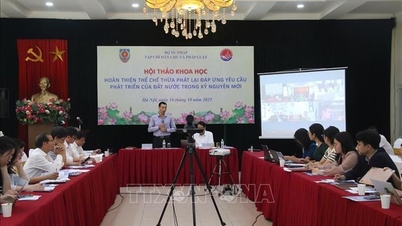














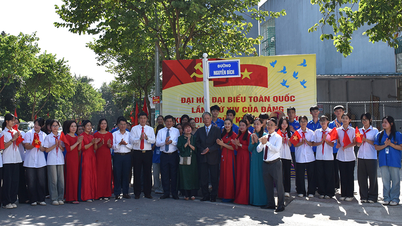







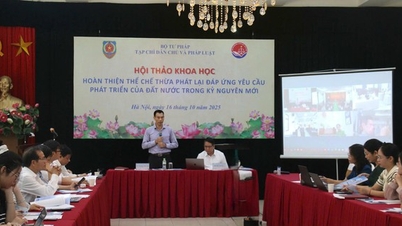

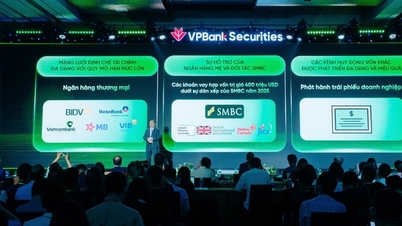








![[Video] TripAdvisor honors many famous attractions of Ninh Binh](https://vphoto.vietnam.vn/thumb/402x226/vietnam/resource/IMAGE/2025/10/16/1760574721908_vinh-danh-ninh-binh-7368-jpg.webp)



























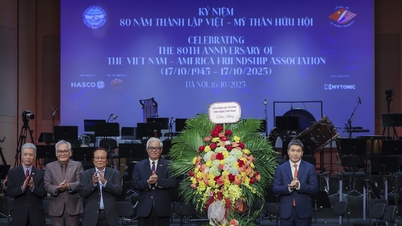
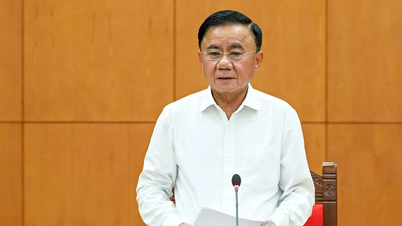



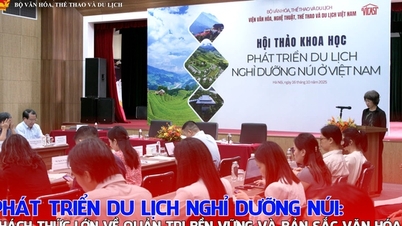
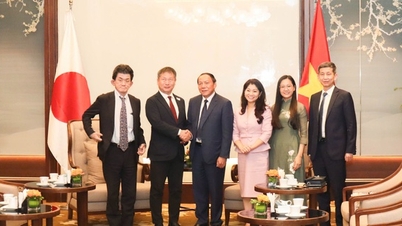
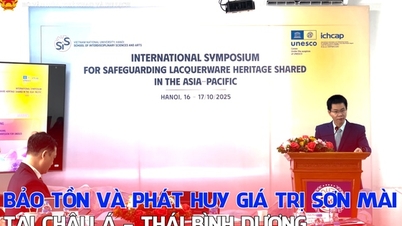
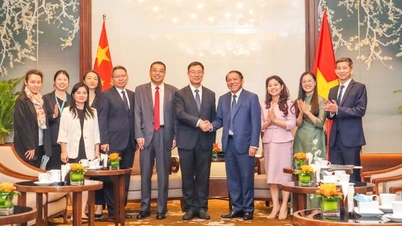
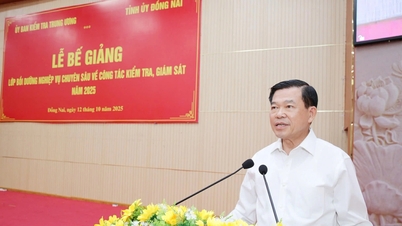




























Comment (0)